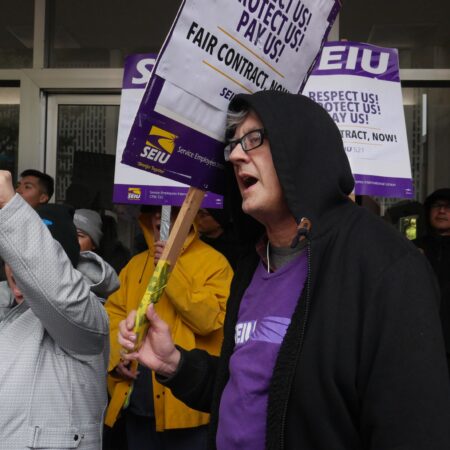California Public Employees’ Pension Reform Act of 2013 (PEPRA)
Print and distribute the flyer (PDF)
Questions:
Who is affected by the new Pension Reform law?
How does the law affect current employees?
How does the law affect both current and new employees?
When does the new law go into effect?
What if I take a new position that pays over the $110,000 cap? Am I considered a new employee?
What determines if someone is a new employee?
How does PEPRA affect Social Security?
What did we beat back?
Does SEIU support this reform?
What can we do about the retirement security crisis?
Concerns about the public pension system come from the public’s own legitimate insecurity about what their retirement will look like.
Nearly half of California workers are at serious risk of falling into poverty or near-poverty when they can no longer work, and 6 million workers in the private sector have no access to workplace retirement savings plan.
SEIU Local 521 Pension Committee is actively engaged in the campaign to fight for our own retirement security and also to promote a secure retirement system for those working in the private sector.
Join our monthly meetings!
Please visit our retirement security blog for upcoming meetings and events.
Q: Who is affected by the new Pension Reform law?
Almost every SEIU 521 member will be affected. Virtually all city, county, school and special district public retirements are covered by PEPRA.
Q: How does the law affect current employees?
Retirement benefit formulas for current employees and employee contributions to pension plans remain UNCHANGED during the life of your contract.
For current employees, the law encourages negotiation of equal sharing of normal cost (50-50) of the pension plan for employer and employee, but does not require it.
After Jan. 1, 2018, the employer will be able to impose equal sharing after the regular bargaining has reached impasse. This means we have five years to negotiate the employee share, but the employer cannot impose the 50-50 share of cost until 2018. At that time the employer may choose to impose that the employee share be 50% of normal costs, or 8%, whichever is lower.
Q: How does the law affect both current and new employees?
1. Eliminates ability to purchase “airtime”: Currently employees can purchase up to five years of additional service credits. Mainly, it’s only upper management that does this because it is expensive to purchase (you pay not only your share but the employer’s share as well.)
2. Felony: A public employee who commits a felony while performing official duties will lose all retirement benefits earned after the date of the felony.
3. Retired Annuitants: If you retire after Jan. 1, 2013, you have to wait for 180 days before returning to work for a public agency. The maximum you may work for a PERS agency is 960 hours per year.
4. Eliminates spiking from special compensation: If your retirement benefit was calculated to include overtime or special bonuses (such as unused vacation or sick leave), that will now be prohibited. (Some contracts currently have this, some don’t.)
5. Eliminates retroactive pension increases: This means if you negotiate a great new contract, new pension improvements are not retroactively applied to prior years of service.
6. Eliminates “pension holidays”: If the economy improves and PERS funding is in super good shape, employers are required to continue to fund annual pension costs and not take a “pension holiday,” which causes the system to be under-funded during bad economic times.
Q: When does the new law go into effect?
Jan. 1, 2013.
Q: What if I take a new position that pays over the $110,000 cap? Am I considered a new employee?
No.
Q: What determines if someone is a new employee?
Your first date of hire with any PEPRA agency is after Jan. 1, 2013.
Q: How does PEPRA affect Social Security?
PEPRA is a state plan and Social Security is federal. PEPRA does not change your eligibility or benefits for Social Security.
Q: What did we beat back?
A hybrid 401k pension system that would have put our retirement funds in a volatile stock market. Changes to retiree healthcare.
Q: Does SEIU support this reform?
AB340 is not a bill we would have written. But it is a negotiated compromise. Most of the issues with pensions in the State of California have been caused by employers giving generous benefits to non-represented management. We support good government and campaigned against abuses in the system. We believe common-sense reform was needed. Most important, we successfully defended our right to collectively bargain any future pension changes.



